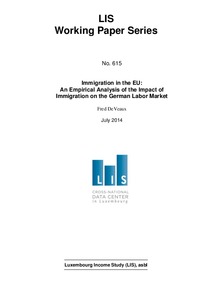Immigration in the EU: an empirical analysis of the impact of immigration on the German labor market

LIS - Luxembourg
2014
29 p.
EU enlargement ; immigration ; labour market ; statistics ; wages
Working Paper
615
Migration
English
Bibliogr.
"This paper analyzes the impact of immigration on Germany's labor market in the context of the recent 2004 and 2007 EU enlargements. In order to measure the effect of immigration supply shocks on individuals' labor outcomes, this paper uses economist George Borjas's “Skill-Group” approach, which divides the workforce into skill-groups determined by education and work-experience. Estimates on the basis of microdata collected by the Luxembourg Income Study in 2004, 2007 and 2010 confirm the hypothesis that immigration depressed annual wages and annual weeks worked for native German citizens. The results indicate that a 10 percent rise of the share of immigrants in the workforce would in general reduce wages of native German citizens by about 3 percent and decrease wages of incumbent foreigners by about 9 percent. Across the different model specifications the negative effect is even larger for immigrant workers and workers in the highest level of education."
Digital
The ETUI is co-funded by the European Union. Views and opinions expressed are however those of the author(s) only and do not necessarily reflect those of the European Union or the ETUI.